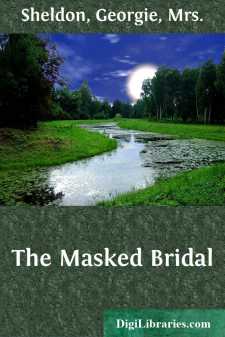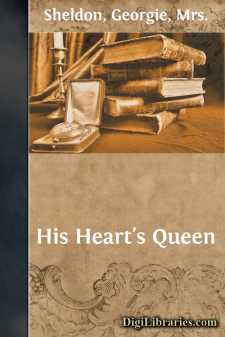Categories
- Antiques & Collectibles 13
- Architecture 36
- Art 48
- Bibles 22
- Biography & Autobiography 813
- Body, Mind & Spirit 141
- Business & Economics 28
- Children's Books 12
- Children's Fiction 9
- Computers 4
- Cooking 94
- Crafts & Hobbies 4
- Drama 346
- Education 46
- Family & Relationships 57
- Fiction 11826
- Games 19
- Gardening 17
- Health & Fitness 34
- History 1377
- House & Home 1
- Humor 147
- Juvenile Fiction 1873
- Juvenile Nonfiction 202
- Language Arts & Disciplines 88
- Law 16
- Literary Collections 686
- Literary Criticism 179
- Mathematics 13
- Medical 41
- Music 40
- Nature 179
- Non-Classifiable 1768
- Performing Arts 7
- Periodicals 1453
- Philosophy 64
- Photography 2
- Poetry 896
- Political Science 203
- Psychology 42
- Reference 154
- Religion 513
- Science 126
- Self-Help 83
- Social Science 81
- Sports & Recreation 34
- Study Aids 3
- Technology & Engineering 59
- Transportation 23
- Travel 463
- True Crime 29
The Masked Bridal
by: Georgie Sheldon
Description:
Excerpt
PROLOGUE.
The most important and the most sacred event in a woman's life is her marriage. It should never be lightly considered, no matter what may be the allurement—honor, wealth, social position. To play at marriage, even for a plausible pretext, is likely to be very imprudent, and may prove a sin against both God and man.
The story we are about to tell chiefly concerns a refined and beautiful girl who, for the ostensible entertainment of a number of guests, agreed to represent a bride in a play.
The chief actors, just for the sake of illustrating a novel situation, and perhaps to excite curiosity among the spectators, were to have their faces concealed—it was to be a masked bridal.
Already the guests are assembled, and, amid slow and solemn music, the principals take their places.
The clergyman, enacted by a gentleman who performs his part with professional gravity and impressive effect, utters the solemn words calling for "any one who could show just cause why the two before him should not be joined in holy wedlock, to speak, or forever hold his peace."
At the sound of these words, the bride visibly shudders; but as she is masked, it can only be inferred that her features must indicate her intense emotion.
But why should she exhibit emotion in such a scene? Is it not a play? She cannot be a clever actress when she forgets, at such a time, that it is the part of a bride—a willing bride—to appear supremely happy on such a joyous occasion.
It is strange, too, that as the bride shudders, the bridegroom's hand compresses hers with a sudden vigorous clutch, as if he feared to lose her, even at that moment.
Was it merely acting? Was this "stage business" really in the play? Or was it a little touch of nature, which could not be suppressed by the stage training of those inexperienced actors?
The play goes on; the entranced spectators are now all aroused from the apathy with which some of them had contemplated the opening part of the remarkable ceremony.
As the groom proceeds to place the ring upon the finger of the bride, she involuntarily resists, and tries to withdraw her hand from the clasp of her companion. There is an embarrassing pause, and for an instant she appears about to succumb to a feeling of deadly faintness.
She rouses herself, however, determined to go on with her part.
Every movement is closely watched by one of the witnesses—a woman with glittering eye and pallid cheek. When the bride's repugnance seemed about to overmaster her, and perhaps result in a swoon, this woman gave utterance to a sigh almost of despair and with panting breath and steadfast gaze anxiously watched and waited for the end of the exciting drama.
The grave clergyman notices the bride's heroic efforts to restrain her agitation, and the ceremony proceeds. At length the solemn sentence is uttered which proclaims the masked couple man and wife.
Then there is a great surprise for the spectators.
As they behold the bride and groom, now unmasked, there is a stare of wonder in every face, and expressions of intense amazement are heard on all sides.
Then it dawns upon the witnesses that the principal actors in the play are not the persons first chosen to represent the parts of the bride and groom.
Why was a change made? What means the unannounced substitution of other actors in the exciting play?
Ask the woman who caused the change—the woman who, with pallid cheek and glittering eye, had intently watched every movement of the apparently reluctant bride, evidently fearing the failure of the play upon which she had set her heart.
It became painfully evident that the play was not ended yet, and some there present had reason to believe that it was likely to end in a tragedy.
Now let us portray the events which preceded the masked bridal.
TWO UNEXPECTED VISITORS.
It was a cold, raw night in December, and the streets of New York city, despite their myriads of electric lights and gayly illuminated shop windows, were dismal and forlorn beyond description.
The sky was leaden. A piercing wind was blowing up from the East River, and great flakes of snow were beginning to fall, when, out of the darkness of a side street, there came the slight, graceful figure of a young girl, who, crossing Broadway, glided into the glare of the great arclight that was stationed directly opposite a pawnbroker's shop.
She halted a moment just outside the door, one slender, shabbily-gloved hand resting irresolutely upon its polished knob, while an expression of mingled pain and disgust swept over her pale but singularly beautiful face....







